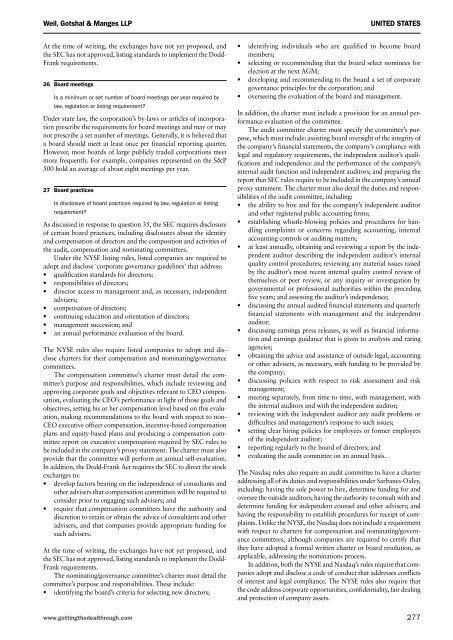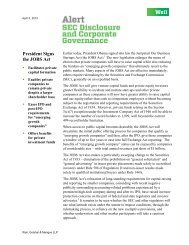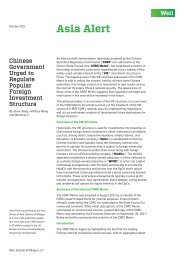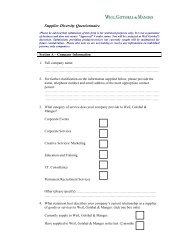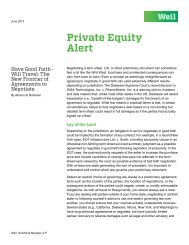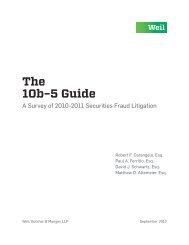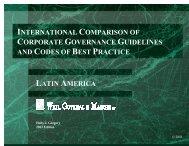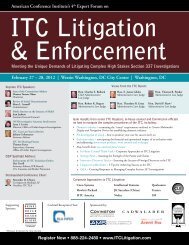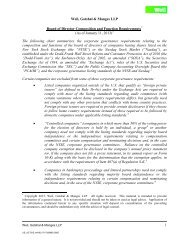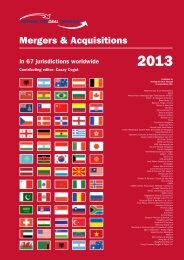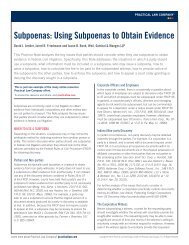Corporate Governance - Weil, Gotshal & Manges
Corporate Governance - Weil, Gotshal & Manges
Corporate Governance - Weil, Gotshal & Manges
Create successful ePaper yourself
Turn your PDF publications into a flip-book with our unique Google optimized e-Paper software.
<strong>Weil</strong>, <strong>Gotshal</strong> & <strong>Manges</strong> LLP<br />
United States<br />
At the time of writing, the exchanges have not yet proposed, and<br />
the SEC has not approved, listing standards to implement the Dodd-<br />
Frank requirements.<br />
26 Board meetings<br />
Is a minimum or set number of board meetings per year required by<br />
law, regulation or listing requirement<br />
Under state law, the corporation’s by-laws or articles of incorporation<br />
prescribe the requirements for board meetings and may or may<br />
not prescribe a set number of meetings. Generally, it is believed that<br />
a board should meet at least once per financial reporting quarter.<br />
However, most boards of large publicly traded corporations meet<br />
more frequently. For example, companies represented on the S&P<br />
500 hold an average of about eight meetings per year.<br />
27 Board practices<br />
Is disclosure of board practices required by law, regulation or listing<br />
requirement<br />
As discussed in response to question 35, the SEC requires disclosure<br />
of certain board practices, including disclosures about the identity<br />
and compensation of directors and the composition and activities of<br />
the audit, compensation and nominating committees.<br />
Under the NYSE listing rules, listed companies are required to<br />
adopt and disclose ‘corporate governance guidelines’ that address:<br />
• qualification standards for directors;<br />
• responsibilities of directors;<br />
• director access to management and, as necessary, independent<br />
advisers;<br />
• compensation of directors;<br />
• continuing education and orientation of directors;<br />
• management succession; and<br />
• an annual performance evaluation of the board.<br />
The NYSE rules also require listed companies to adopt and disclose<br />
charters for their compensation and nominating/governance<br />
committees.<br />
The compensation committee’s charter must detail the committee’s<br />
purpose and responsibilities, which include reviewing and<br />
approving corporate goals and objectives relevant to CEO compensation,<br />
evaluating the CEO’s performance in light of those goals and<br />
objectives, setting his or her compensation level based on this evaluation,<br />
making recommendations to the board with respect to non-<br />
CEO executive officer compensation, incentive-based compensation<br />
plans and equity-based plans and producing a compensation committee<br />
report on executive compensation required by SEC rules to<br />
be included in the company’s proxy statement. The charter must also<br />
provide that the committee will perform an annual self-evaluation.<br />
In addition, the Dodd-Frank Act requires the SEC to direct the stock<br />
exchanges to:<br />
• develop factors bearing on the independence of consultants and<br />
other advisers that compensation committees will be required to<br />
consider prior to engaging such advisers; and<br />
• require that compensation committees have the authority and<br />
discretion to retain or obtain the advice of consultants and other<br />
advisers, and that companies provide appropriate funding for<br />
such advisers.<br />
At the time of writing, the exchanges have not yet proposed, and<br />
the SEC has not approved, listing standards to implement the Dodd-<br />
Frank requirements.<br />
The nominating/governance committee’s charter must detail the<br />
committee’s purpose and responsibilities. These include:<br />
• identifying the board’s criteria for selecting new directors;<br />
• identifying individuals who are qualified to become board<br />
members;<br />
• selecting or recommending that the board select nominees for<br />
election at the next AGM;<br />
• developing and recommending to the board a set of corporate<br />
governance principles for the corporation; and<br />
• overseeing the evaluation of the board and management.<br />
In addition, the charter must include a provision for an annual performance<br />
evaluation of the committee.<br />
The audit committee charter must specify the committee’s purpose,<br />
which must include: assisting board oversight of the integrity of<br />
the company’s financial statements, the company’s compliance with<br />
legal and regulatory requirements, the independent auditor’s qualifications<br />
and independence and the performance of the company’s<br />
internal audit function and independent auditors; and preparing the<br />
report that SEC rules require to be included in the company’s annual<br />
proxy statement. The charter must also detail the duties and responsibilities<br />
of the audit committee, including:<br />
• the ability to hire and fire the company’s independent auditor<br />
and other registered public accounting firms;<br />
• establishing whistle-blowing policies and procedures for handling<br />
complaints or concerns regarding accounting, internal<br />
accounting controls or auditing matters;<br />
• at least annually, obtaining and reviewing a report by the independent<br />
auditor describing the independent auditor’s internal<br />
quality control procedures; reviewing any material issues raised<br />
by the auditor’s most recent internal quality control review of<br />
themselves or peer review, or any inquiry or investigation by<br />
governmental or professional authorities within the preceding<br />
five years; and assessing the auditor’s independence;<br />
• discussing the annual audited financial statements and quarterly<br />
financial statements with management and the independent<br />
auditor;<br />
• discussing earnings press releases, as well as financial information<br />
and earnings guidance that is given to analysts and rating<br />
agencies;<br />
• obtaining the advice and assistance of outside legal, accounting<br />
or other advisers, as necessary, with funding to be provided by<br />
the company;<br />
• discussing policies with respect to risk assessment and risk<br />
management;<br />
• meeting separately, from time to time, with management, with<br />
the internal auditors and with the independent auditor;<br />
• reviewing with the independent auditor any audit problems or<br />
difficulties and management’s response to such issues;<br />
• setting clear hiring policies for employees or former employees<br />
of the independent auditor;<br />
• reporting regularly to the board of directors; and<br />
• evaluating the audit committee on an annual basis.<br />
The Nasdaq rules also require an audit committee to have a charter<br />
addressing all of its duties and responsibilities under Sarbanes-Oxley,<br />
including: having the sole power to hire, determine funding for and<br />
oversee the outside auditors; having the authority to consult with and<br />
determine funding for independent counsel and other advisers; and<br />
having the responsibility to establish procedures for receipt of complaints.<br />
Unlike the NYSE, the Nasdaq does not include a requirement<br />
with respect to charters for compensation and nominating/governance<br />
committees, although companies are required to certify that<br />
they have adopted a formal written charter or board resolution, as<br />
applicable, addressing the nominations process.<br />
In addition, both the NYSE and Nasdaq’s rules require that companies<br />
adopt and disclose a code of conduct that addresses conflicts<br />
of interest and legal compliance. The NYSE rules also require that<br />
the code address corporate opportunities, confidentiality, fair dealing<br />
and protection of company assets.<br />
www.gettingthedealthrough.com 277


